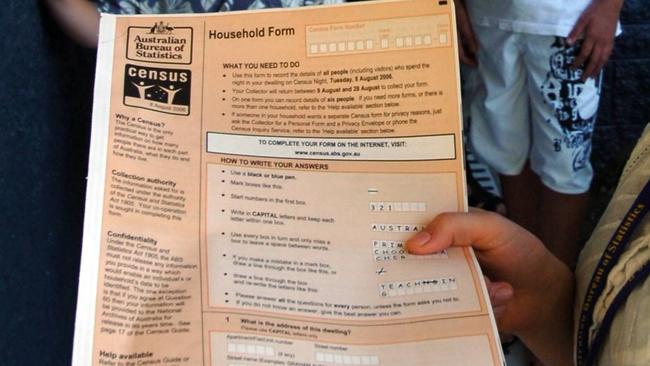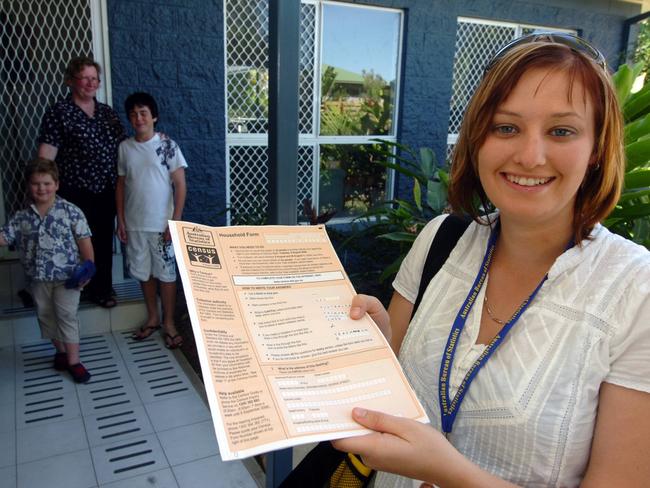Census Day is about to get a lot more personal
HOW much should we trust the government? That’s the eerie question on Australian citizens’ minds after revelations about the 2016 Census.

HOW much should we trust the government? That’s the eerie question on Australian citizens’ minds after revelations the 2016 Census will not be entirely anonymous.
And there are fears the changes could undermine the exercise, with predictions of widespread civil disobedience by citizens who may refuse to participate when collectors come knocking in August — or give the equivalent of an election year ‘dummy vote’.
While the compulsory five-yearly headcount has always been a chore, it came with the disclaimer that all information collected — ranging from occupation and marital status to whether you’re a Muslim or a Jedi Knight — would be strictly anonymous.
After being stripped of identifying markers, the data went straight into the Australian Bureau of Statistics’ spreadsheets and computer programs for analysis, coming out the other end as useful stats that help policymakers, political leaders and think tanks come up with ways to improve the nation.
But it’s been revealed that this year, the ABS will hang onto our names and addresses instead of shredding them, a prospect that has horrified privacy advocates — and may well lead to mass boycotts.
In December last year, the bureau announced in a post on its website that it had decided to retain identifying information “in order to enable a richer and dynamic statistical picture of Australia through the combination of Census data with other survey and administrative data”.
“Whilst the Census has always been valuable in its own right, when used in combination with other data the Census can provide even greater insight,” the ABS said.
Examples given included combining that data with education records to “provide insight into employment outcomes from the various educational pathways available to Australians”, and cross referencing it with health data to “help improve Australia’s understanding and support of people who require mental health services”.
That’s right: If you have a mental illness, the government wants to know more about you so it can “design better programs of support and prevention”.

Unsurprisingly, news of the updated protocols has been met with dismay.
Privacy consultant Nigel Waters, who advised the ABS in relation to an earlier, abandoned proposal to retain identifying data, told the ABC the move threatened to undermine the credibility of the Census.
“In privacy terms, it’s clearly a major intrusion and one that is going to be unwelcomed to a lot of people,” Mr Waters said.
“Secondly, it’s not worth the risk in terms of the integrity of the census data, which is very important for the nation — because if people really can’t trust the information they give is going to be kept confidential ... then they’re either going to sabotage it by giving the wrong information, or refuse to give the information in the first place.”
And he warned that the pool of data could be misused by governments and miscreants alike, calling it “the biggest honey pot of information that was ever created in terms of its attractiveness to commercial organisations or to hackers”.
The head of the 2016 census program, Duncan Young, said confidentiality would still be protected as the names and addresses would be stored separately from the answers to the Census questions, and pointed to the ABS’ track record of protecting privacy.
But will that be reassurance enough to those of us who fear the potential for big data to be used against us?
While many of us willingly hand over highly personal information to corporations like Facebook, there’s something about a government official knocking on your door and demanding that you answer his or her questions.
Perhaps that’s why only half of Australians currently opt into a program that allows names and addresses, along with Census data, to be kept by the National Archives and opened 100 years later.
The ABS responded to the furore with another statement on its website by statistician David Kalisch.
“The ABS never has and never will release identifiable Census data,” Mr Kalisch said.
In response to media reports that raised concerns that privacy legislation could be changed to remove existing protections, he said:
“Privacy of data collected is a fundamental pillar of an official statistical system. In Australia these protections have existed since the foundation of the Australian Bureau of Statistics in 1905. This will not change.”
We sure hope not.




